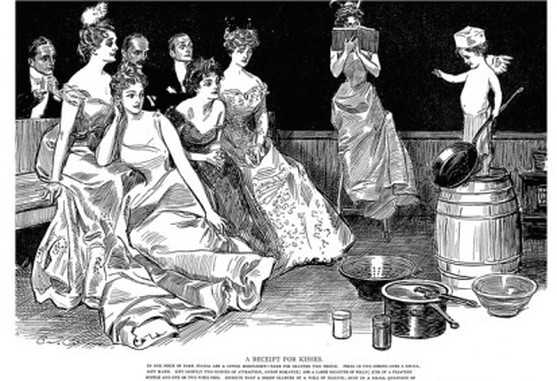Maintaining this website (which you are enjoying for free!) takes a lot of time and resources.
Please show your support for all our hard work by telling your friends about Sarah's books —and by buying them yourself, too, of course!
Historical Article
A Chef's Recipe for a Tender Husband
Barrows, J.P. The Cosmopolitan November 1888, p. 201.
"The chief cause of indigestion at the table of marriage is that wives do not know how to cook their husbands without making them tough. Some women keep their husbands constantly in hot water; others let them freeze by their carelessness and indifference. Some keep them in a stew by irritating words and ways. Others roast them. Some keep them in a pickle all their lives. It can not be supposed that any husband will be tender and good managed in this way, but they are really delicious when properly treated.
In selecting your husband you should not be guided by the silvery appearance as in buying mackerel, nor by the golden tint as if you wanted salmon. Be sure and select him yourself, as tastes differ. Do not go to the market for him, as the best are always brought to the door. It is far better to have none unless you will patiently learn how to cook him. See that the linen in which you wrap him is nicely washed and mended, with the required number of required buttons and strings sewed on. Tie him in the kettle by a strong silk cord called comfort, as the one called duty is apt to be weak. Otherwise they may jump from the kettle and be burned and crusty on the edges, since, like crabs and lobsters, you have to cook them alive.
Make a clear, steady fire out of love, neatness, and cheerfulness. Set him as near this as seems to agree with him. If he sputters and fizzes, do not be anxious; some husbands do this until they are quite done. Add a little sugar in the form of kisses, but no vinegar or pepper on any account. A little spice improves them, but it must be used with judgement. Do not stick any sharp instrument into him to see if he is becoming tender. Stir him gently; watch the while, lest he lie too flat and close to the kettle, and so become useless. You can not fail to know when he is done. If thus treated you will find him very digestible, agreeing nicely with you and the children, and he will keep as long as you want, unless you become careless and set him in a cold place."
***
If you liked this article you might also enjoy:
A Man in the Kitchen: The Difference Between A "Betty" And the Other Kind (1889)
An Old Maid's Paradise (1889)
A Woman Without Cares or Children (1889)
Individuality and Equality (1894)
Woman's Exchanges as Training Schools and Markets for Work (1894)
Women Inventors (1897)
Woman's Work for Woman (1889)
***
Back to Historical Articles Index
***
In a seaport town in the late 19th-century Pacific Northwest, a group of friends find themselves drawn together —by chance, by love, and by the marvelous changes their world is undergoing. In the process, they learn that the family we choose can be just as important as the ones we're born into. Join their adventures in
The Tales of Chetzemoka
To read about the exhaustive research that goes into each book, click on their "Learn More" buttons!
Buy the book
|
First Wheel in Town:
|
Buy the book
|
Love Will Find A Wheel:
|
Buy the book
|
A Rapping At The Door:
|
Buy the book
|
Delivery Delayed:
|
***
Anthologies
Love's Messenger
|
The Wheelman's Joy
|
Quotations of Quality
|
Words For Parting
|
***
If our website has been helpful to you,
please consider making a cash donation.
Your generous support
helps us maintain this website and continue our outreach, so that we can keep teaching others about the history we love.
Everything helps and is appreciated!
Search this website:
***









